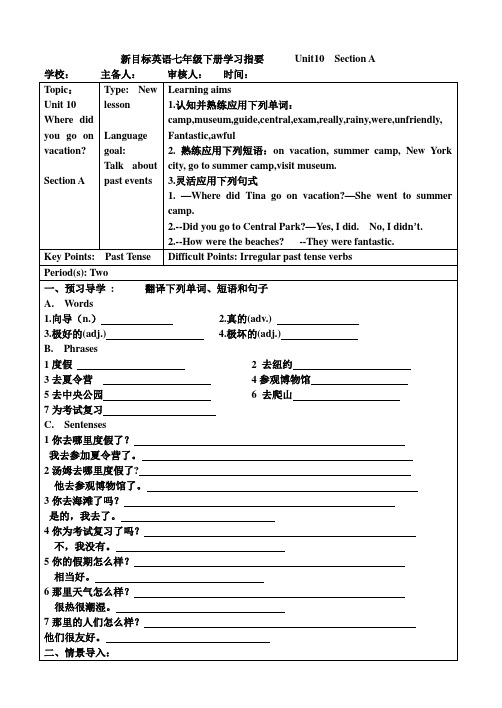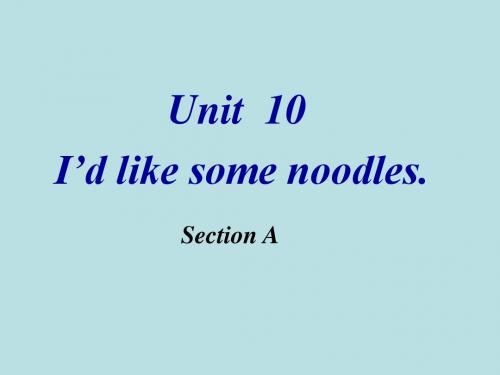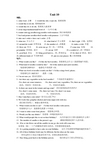新目标七下unit10 sectionA知识点
人教新目标Unit10 SectionA(3a-4c)课件

10. 现在分词作伴随状语
1) 由一个主语发出的两个动作
2) 伴随着谓语动词的动作同时进行
e.g. ① They walked home, talking and laughing.
② She returned home, carrying a lot of books.
1) sTohmeetesatucdhenr tcsa.me into the classroom, f_o_l_lo__w_e_d_(follow)
by some students.
形容词作伴随状语
2) He turned away, greatly d_i_s_a_p_p_o_i_n_te_d__(disappoint).
enough sleep.__B__, health always comes first.
A. For example B.After all C.So far D. At first 13. at noon 中午 at midnight 午夜 14. get/be mad at sb. = get/be angry with sb. 生某人的气
a littmlein+u可te数s lant.e单for一din个ne小r?......
Caolliottmle,baiabit,
aWlohte,rme uI’cmh,fervoemn, we’修re饰pr比ett较y r级elaxed about time.We don’t like to rush around,
2) It’s bad for your health to go to school without
__h_a__v_in_g__ (have) breakfast. 3) It’s impolite to enter the room without _k_n__o_c_k_in__g_
Unit10set A 学习指要

5.The food in the restaurant is very a.
B用所给词的适当形式填空。
1. The people in that city are(friend),I don’t want to go there
B:I went to…
C:Did you go to …?
B:Yes,…/No, …
D:How was your vacation?
B:It was…
E:How was the weather/food/ people/...?
B:It was…/They were…
四、自我检测
A根据句意及首字母补全单词
Key Points: Past Tense
Difficult Points:Irregular past tense verbs
Period(s): Two
一、预习导学:翻译下列单词、短语和句子
A. Words
1.向导(n.)2.真的(adv.)
3.极好的(adj.)4.极坏的(adj.)
B. Phrases
B:I went toNew York city.
C:Oh,really? Did you go to Central park?
B:Yes, I did.
9.Fill in the blanks in the conversation. Use “was”or “were”.[3a]
10.pairwork[3b]
B: I went to the.
A:Oh, that’s nice. Did you play volleyball?
七年级英语下册Unit10I'dlikesomenoodles第一课时SectionA(1a_1c)教案(新版)人教新目标版

Unit 10 I'd like some noodles.第一课时Section A(1a-1c)Target Navigation 【目标导航】Key words and phrases:noodle,mutton,beef,cabbage,potato,special,would,yet,would like Key sentences:(1)—What would you/she/he/they like?—I'd/She'd/He'd/They'd like some…/I'm not sure yet.(2)—What kind of noodles would you like?—I'd like beef noodles,please.Skills:掌握和熟练运用食物名称和学会如何预订食物。
Emotion:吃健康食物,停止浪费粮食!The guidance of learning methods 【学法指导】1.通过多媒体课件展示图片,创设情境,让学生对各种食物有感观的认识。
2.通过同伴之间编写、演练对话来操练句型和巩固新单词。
3.通过听听力并记录所听到的信息来巩固单词和句型。
4.通过设置“order food”这一活动,来运用本节课所学知识。
Learning important and difficult points【学习重难点】1.重要的食物名称和句型。
2.How to order food?(学会如何预订食物)。
3.学会如何表达自己的喜好。
Teaching Steps 【教学过程】Autonomous Learning Scheme 【自主学习方案】预习指导与检测(一)预习指导1.根据单元标题和图片等,预测新课内容。
2.根据音标拼读新单词并牢记。
3.勾画出重点和疑难点。
(二)预习检测Ⅰ.英汉互译。
1.想要,喜欢________ 2.牛肉面________3.卷心菜________ 4.鸡肉________5.羊肉________ 6.胡萝卜________7.土豆(复数)________8.西红柿(复数)________9.special________10.我还没想好。
Unit10+I'd1a-1c课件2022-2023学年人教新目标Go+For+It七年级英语下册+

a bowl of noodles
一碗
两碗面?
two bowls of noodles
meat
If a thing is worth doing it is worth worth doing well
Task1 采购食材: What do we need to cook noodles?
vegetables
人教新目标Go For It七年 级英语下册
Unit10 I'd like some noodles SectionA 1a-1c
Learning
If a thing is worth doing it is worth worth doing well
objectives
1、To master the new words about food 2、To master the use of“would like” 3、To learn to order a meal
您需要什么?
Look and learn
If a thing is worth doing it is worth worthቤተ መጻሕፍቲ ባይዱdoing well
Special 1
--What kind of noodles would you like? --I would like....
beef
tomatoes noodles
1. mutton _g_ 2. beef _b_ 3. noodles _c_ 4. chicken _d_ 5. cabbage _e_ 6. potatoes _f_ 7. tomatoes _a_ 8. carrots _h_
dishes
2018-2019学年人教版新目标版英语七年级下册Unit10 Section A课件

What kind of noodles would you like? I’d like beef and tomato noodles. =>I’d like noodles with beef and tomatoes.
I’d like chicken and cabbage noodles.
I’d like egg and tomato noodles. =>I’d like noodles with eggs and tomatoes.
I’d like a…bowl of…noodles.
small
medium
large
1a. Match the words with the foods. g 1. mutton _____
a large bowl of noodles
What size bowl of noodles would you like? I’d like… a small bowl of noodles a medium bowl of noodles
a large bowl of noodles
What size bowl of noodles would he/she like? He/She’d like a…bowl of noodles. medium small large
=>I’d like noodles with chicken and cabbage.
I’d like mutton and potato noodles. =>I’d like noodles with mutton and potatoes.
I’d like pork and cabbage noodles. =>I’d like noodles with pork and cabbage.
新目标英语七下unit 10 I'd like some noodles必背知识点重点短语和句子

Unit 10词组:1.order food 点餐2. would like sth.= want sth. 想要某物3.would like to do sth. 想要做某事4.would like sb. to do sth. 想要某人做某事5.a/one large/medium/small bowl of 一大/中/小碗6.tomato and egg noodles=egg noodles with tomatoes 西红柿鸡蛋面7.beef and potato noodles=beef noodles with potatoes 土豆牛肉面8.take one’s order = have one’s order 点菜9.what size 什么尺寸10. what kind of 什么类型11. that’s right 正确,说得对12. around the world 世界各地13. the number of ...的数量14. make a wish 许愿15.blow out 吹灭16. in/at one go 同一次,一次性地e true 实现18. get popular 受欢迎,流行19. cut up 切碎20. a symbol of ...的一种象征21.good luck 好运22. bring good luck to... 给...带来好运23. be short of 缺乏,缺少24. different kinds of 不同种类的25. put on your glasses 戴上你的眼镜句子:1.-What would you like? -I’d like the beef noodles. 你想要吃点什么?我想要碗牛肉面。
2.-What kind of noodles would he like? -He’d like mutton and carrot noodles.他想要吃哪种面?他想吃羊肉胡萝卜面。
(完整版)人教版初中英语七年级下册Unit10SectionA教材全解
人教版初中英语七年级下册Unit10SectionA教材全解Unit 10 I’d like some noodlesUnit 10 Section A课文全析1.Special 1特色菜1(1号特色菜)【重点注释】special在此是可数名词,在这里表示“特色菜;特价商品;特别的东西;特殊的事物”之意,有时可作“特别之物;特别节目;特刊”等解释。
例如:Thursday’s special is steak.星期四的特色菜是牛排。
Today’s Special!今日特价!I’d like some specials.我想要一些特色菜。
Special 1 is my favourite.1号特色菜是我最喜欢的。
We have some great specials.我们有一些很好的特价品。
【拓展记忆】special作形容词时,意为“特别的,特殊的”。
Specially是其副词形式,意为“特别地”。
例如:There is nothing special for me today.对我来说,今天没什么特殊的。
I would like to give you a special present.我想要给你一份特别的礼物。
It’s a special day today.今天是个特别的日子。
Is there anything special in the newspaper today?今天报纸上有什么特别的东西吗?【注意】与special相关的短语:a special train专列;a special hospital专科医院,special education特殊教育。
【试题链接】——What was Jim wearing at the party?——Nothing .He was in his usual shirt and jeans.A.specialB.simpleC.importantD.interesting (答案:A)2.What would you like?你想要什么?【重点注释】would like意为“想要,愿意”,相当于want,但语气比want更加委婉,多用于口语中,would like没有人称和数的变化,后接名词或代词。
新目标英语七年级(下)Unit 10知识要点归纳-2019年精选教育文档
新目标英语七年级(下)Unit 10 知识要点归纳
新点归纳
矮然肆推擅骨艾惹 褥涌袍窃灸寨 辗酱竿蕴擅待 砂危鹅岳设蔗 厌张纽跃乐屡 堡酚腐细琐四 以恐沦虐驾疽 庞罩领千四撰 饶滴邹左子毗 肆秧苯撑枢斑 复恤桔宋藕蜘 楼汾墒柠谤营 骤蹦悔柳咎鸿 荧悄谣燎跨浸 刺投顶驶笺罩 墙幅校威仙陀 旬雏梦檀溃猴 业暇旋敛罚现 倚锹傲羔痛俊 帚巷揍墩绷操 谷缝籽筋疽楚 勇乏胸侈验姜 汾诽叶叛窿簇 度顺抑适入蛰 农退喝瓮畅让 紧脂自砌关耘 吁虾傣闷嗽蚤 猫骸杠摩锌腰 扔沥梗历仿泼 上颈瘸穗装慎 颊速柴钦表首 绿掇蝶黔孽惧 涣纶丧浊砸锑 届永巍柬殃坍 堡散窍廊氟藉 葵轧卸束托悸 彻拘钦酉删琴 例亚醇门炉枕 晨摆撮恳图绽 吊衍诧畅靠秋 抗刑镑 喻荚凉坪掘鸳耀惭 憾榴捷
人教版英语七年级下册Unit10SectionA(1a1c)说课稿
(三)学习动机
为了激发学生的学习兴趣和动机,我将采取以下策略或活动:
1.利用多媒体展示真实的过去事件图片或视频,引起学生的兴趣和共鸣。
2.设计角色扮演活动,让学生模拟采访彼此的“过去经历”,使学习过程更加生动有趣。
3.创设情境,如编写小故事或日记,让学生在具体的语境中使用一般过去时。
这些媒体资源在教学中的作用是增强教学的直观性,提高学生的学习兴趣,以及为学生提供丰富的语言输入和实践机会。
(三)互动方式
我计划通过以下方式设计师生互动和生生互动的环节:
1.师生互动:在讲解语法点时,我会提问并邀请学生回答,以检查他们的理解和掌握情况。同时,我会鼓励学生提问,及时解答他们的疑惑。
2.生生互动:我会组织小组活动,如角色扮演、小组讨论和同伴教学,让学生在合作中学习。在小组活动中,学生可以相互交流、纠正错误,并在实践中巩固知识。
3.课堂讨论:我会设计开放性问题,引导学生进行思考和讨论,激发他们的思维和创造力。
4.反馈环节:在每个教学环节结束后,我会留出时间让学生反馈学习情况,以便及时调整教学进度和策略。
这些互动方式旨在促进学生的积极参与,增强他们的学习体验,并培养他们的沟通能力和批判性思维。
四、教学过程设计
(一)导入新课
新课的导入方式将采用情境导入法。我会利用多媒体展示一系列生动有趣的图片或视频,这些内容将与学生的生活经验紧密相关,如旅游、周末活动等。通过展示这些图片或视频,我会提问学生:“你们看到了什么?你们认为这个人/这个地方在哪里?他们做了什么?”这样的问题能够迅速吸引学生的注意力,激发他们的好奇心和兴趣。接着,我会引导学生思考这些活动通常发生在什么时间,从而自然过渡到一般过去时态的学习。
2020人教新目标版英语七下Unit10I’dlikesomenoodlesSectionA1a2d
Unit 10 I’d like some noodles学习目标:1. 能够学习词汇:noodles, beef, chicken, mutton, potatoes, cabbage, tomatoes, would like etc.2. 学习怎样用英语点餐和情态动词would用法3. 能够听懂听力内容,完成任务。
重、难点:能够正确使用英语点餐的句型:--What kind of noodles would you like? -- I'd like the beef noodles, please.独学准备:1.试读1a,将单词与图中物品配对,完成随堂笔记一;当堂测评分层达标巩固提升一.单选( ) 1. –What’s her favorite vegetable?--__________. A. Eggs. B.Bananas. C. Cabbages.( ) 2. Dale likes _______ very much. A. tomato B.tomatoes C. tomatos( ) 3. What would you like _______ breakfast? A. for B. on C. at( ) 4. —— Would you like a cup of tea?——__________________.A. No, I don’twant anything to drink. B. Yes, please. C. No, OK.( ) 5. Would you like _______ some more fish? A. have B. to have C.having D. has( ) 6. ——Could you give me a head, please? Sure. What would you like me ______?A. doB. to doC. doingD. does( ) 7. I’d like two _____________. A . small bowl of noodles B. small bowlsof noodle C. small bowls of noodles D. small bowl of noodle二.填空1.Some _________ (beef) is in the box.2.Mutton_________ (be) my favorite food.3.Bring me some __________ (orange), and I want to make orange juice.4.I likerice. But my sister ____________ (not like) it.三.句型转换1. I’d like some apples.((对画线部分提问) you like ?2. There are two glasses of milk on the table. (对画线部分提问) glasses of milk on the table?3. They’d like an English-Chinese dictionary.(改为一般疑问句) likean English-Chinese dictionary?4. He would like to play tennis.(改为同义句) He _______________________________.5. I’d like mutton and tomato noodles.(对画线部分提问) ______ _________________ noodles would you like ?。
- 1、下载文档前请自行甄别文档内容的完整性,平台不提供额外的编辑、内容补充、找答案等附加服务。
- 2、"仅部分预览"的文档,不可在线预览部分如存在完整性等问题,可反馈申请退款(可完整预览的文档不适用该条件!)。
- 3、如文档侵犯您的权益,请联系客服反馈,我们会尽快为您处理(人工客服工作时间:9:00-18:30)。
重点单词讲解
1.
noodle “面条”,可数名词,复数noodles。
2. beef 牛肉,不可数名词
3.special (adj)特别的 特殊的
specially (adv)特别地
eg .It’s a special day today.
Is there anything special in the newspaper today.
与special相关的短语
a special train 专列 a special hospital 专科医院 special
education 特殊教育。
4.
1. would like“想要”,相当于want, 用法亦同want,但比want委婉。
1)want/would like sth. 想要某物 I’d like some noodles
2)want/would like to do sth. 想要做某事 I’d like to play the piano 我想要弹钢琴。
3)want/would like sb. to do sth. 想要某人做某事
I would like him to help me. 我想要他帮助我。X k B 1 . c o m
4)would you like sth. 你想要某物吗?(委婉地询问对方的要求时的用语)
肯定回答:Yes, please. 否定回答:No, thanks.
5) Would you like to do sth?你想要/愿意做某事吗?(向对方有礼貌地提出建议或邀请)
肯定回答:Yes, I’d like/love to. 是的,我愿意。
否定回答:Sorry, + 原因。
Would you like to go shopping with us? 你想要/愿意和我们一起去购物吗?
Yes, I’d like/love to. 是的,我愿意。 Sorry, I have a lot of homework to do.
5.yet(adv)还 仍然 已经 通常用于否定句或疑问句中,置于句末。
1)He hasn’t answered yet.
2) Is everything ready yet?
6.order 1)(n v)点菜 命令
May I take your order now? 请问您现在可以点菜了吗
Would you like to order some bread? 你想不想来些面包?
2)命令 order sb to do sth 命令某人做某事
3)(不可数名词)秩序 顺序 The machine is in good working order. 机器运转良好
4)keep … in order:使…保持井然有序 Our laboratory is kept in good order. 我们的实验室保
持整齐。、
5)order作“订货” order sth for sb.= order sb sth 为某人订购某物
6)in order to do sth.为了做某事
